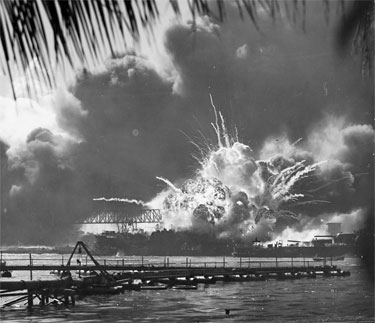Jake Shannon interviews author Robert Stinnett - "Pearl Harbor a False Flag Operation?"
Day Of Deceit: The Truth About FDR and Pearl Harbor Paperback – May 8, 2001

By Author Robert Stinnett
In Day of Deceit, Robert Stinnett delivers the definitive final chapter on America's greatest secret and our worst military disaster.
Drawing on twenty years of research and access to scores of previously classified documents, Stinnett proves that Pearl Harbor was not an accident, a mere failure of American intelligence, or a brilliant Japanese military coup. By showing that ample warning of the attack was on FDR's desk and, furthermore, that a plan to push Japan into war was initiated at the highest levels of the U.S. government, he ends up profoundly altering our understanding of one of the most significant events in American history.
*****************************
October 7, 1940: The Day That Should Have Lived in Infamy
On October 7, 1940, exactly
fourteen months before the infamous attack on Pearl Harbor on December
7, 1941, Lieutenant Commander Arthur H. McCollum penned a memorandum,
recommending that the United States government provoke the Japanese into
attacking America, and thus, allowing America to enter WWII with the
American people fully behind the decision. The memorandum is called theMcCollum memo, and there is little mention of it in history textbooks.
 |
|
| FDR not only knew about the attack in advance, but his administration did everything it could to cause a Japanese attack on America. Photo: the National Archives. | |
Over the years there were rumors
that “FDR allowed the Pearl Harbor attack to happen” but these were cast
aside as crackpot conspiracy theories, backed by zero evidence. But
such dismissals didn’t work when Robert Stinnett published his book“Day Of Deceit: The Truth About FDR and Pearl Harbor”in 1999.Stinnett,
a decorated WWII veteran and author, requested files about the attack,
and the events preceding it, through the Freedom of Information Act
(FOIA). He discovered that FDR not only knew about the attack in
advance, but that his administration did everything it could to cause a
Japanese attack on America. One of the most important pieces of
information that Stinnett came across was the McCollum memo, which
outlined eight points that the FDR administration could do to instigate a
dramatic response by the Japanese without the Congress, or the American
people getting too suspicious, like cutting off economic ties with
Japan, refusing it oil, establishing relations with Japan’s main enemy,
China, and other provocations. Stinnett’s book is centered on the new
historical evidence that he gathered, which is rigorously documented.
He gave an interview to Douglas
Cirignano in 2002 about how he came to his conclusion that the FDR
administration pushed America into a war that the majority of the
American people were dead set against prior to the attack on December 7.
The interview is archived at the Independent Institute, and it is
called“Do Freedom of Information Act Files Prove FDR Had Foreknowledge of Pearl Harbor?”An excerpt:
Another claim at the heart of
the Pearl Harbor surprise-attack lore is that Japan’s ships kept radio
silence as they approached Hawaii. That’s absolutely untrue, also?
Stinnett:That is correct. And this was all withheld from Congress, so nobody knew about all this.
Until the Freedom of Information Act.
Stinnett:Yes.
Is this statement true?—If
America was intercepting and decoding Japan’s military messages then
Washington and FDR knew that Japan was going to attack Pearl Harbor.
Stinnett:Oh, absolutely.
You feel it’s as simple as that?
Stinnett:That is
right. And that was their plan. It was their “overt act of war” plan
that I talk about in my book that President Roosevelt adopted on October
7, 1940.
You write that in late
November 1941 an order was sent out to all US military commanders that
stated: “The United States desires that Japan commit the first overt
act.” According to Secretary of War Stimson, the order came directly
from President Roosevelt. Was FDR’s cabinet on record for supporting
this policy of provoking Japan to commit the first overt act of war?
Stinnett:I don’t
know that he revealed it to the cabinet. He may have revealed it to
Harry Hopkins, his close confidant, but there’s no evidence that anybody
in the cabinet knew about this.
I thought you wrote in your book that they did…That some of them were on record for…
Stinnett:Well,
some did. Secretary of War Stimson knew, based on his diary, and also
probably Frank Knox, the Secretary of Navy knew. But Frank Knox died
before the investigation started. So all we have really is Stimson, his
diary. And he reveals a lot in there, and I do cite it in my book…You
must mean his war cabinet. Yes. Stimson’s diary reveals that nine people
in the war cabinet—the military people—knew about the provocation
policy.